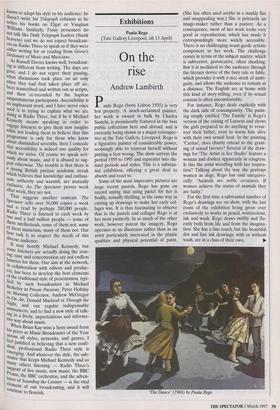Proud to be populist
Nicholas Kenyon replies to Michael Kennedy's criticism of him and Radio Three At the end of an exhilarating week which saw the launch of one of Radio Three's most important projects, its large- scale festival of 20th-century music Sound- ing the Century — inaugurated by a performance under Pierre Boulez of Stravinsky's The Rite Of Spring described variously in the papers as 'stupendous', `stunning' and 'shattering' — was it depressing to open The Spectator (Arts, 22 February) and find, instead of any mention of this venture, another tired rant against Radio Three's so-called 'accessibility' by Michael Kennedy? Not particularly, for it is par for the course that commentators take far more notice of our style than of our substance (there is not a whit less demanding and challenging music on Radio Three these days than there used to be), and such attacks at least reassure us that what we are doing has been noticed. Personally, what I really object to is not Michael Kennedys accusation that under my controllership Radio Three has become more approach- able, but his accompanying attempt at a compliment — that in a previous existence I was 'once the anything but populist critic of the Observer who certainly wrote de haut en has and good luck to him.' As insults go, this is rich. De has en haut, I salute Michael Kennedy for the consistendY high standard of his writing about music. But to suggest that I was ever not a populist is a slur. Everything I have ever done in writing about, talking about, broadcasting or most recently programming music has been done out of a desire to popularise it — which is to say to share one's enthusiasms, to communi- cate them, and to encourage others W explore them. Why else is Michael Kennedy, a fellow enthusiast, writing about music in the papers? The real irony of Kennedy's diatribe is that most of us would consider him to be one of the best populist writers about clas- sical music. I don't see his Sunday TeIe graph columns strewn with terms like rubato or chiaroscuro, but with strongly held opinions and great learning very light- ly worn. So why does he expect to find this technical abstruseness on Radio Three? He knows to adapt his style to his audience: he doesn't write his Telegraph columns as he writes his books on Elgar or Vaughan Williams. Similarly, Today presenters do not talk like Daily Telegraph leaders (thank heavens) and we do not expect broadcast- ers on Radio Three to speak as if they were either writing for or reading from Grove's Dictionary of Music and Musicians. As Russell Davies knows well, broadcast- ing is different from writing. The days are gone, and I do not regret their passing, When discussions took place on air only when they had first taken place off air, been transcribed and written out as scripts, and then re-recorded by the hapless unspontaneous participants. Accessibility is an unpleasant word, and I have never once used it in trying to explain what we are doing at Radio Three, but if by it Michael Kennedy means speaking in order to engage listeners to give them new insights while not leading them to believe that this Programme is only for those who know *out diminished sevenths, then I concede that accessibility is indeed one quality for Which we strive. Of course we speak seri- ously about music, and it is absurd to sug- gest otherwise. The trouble is that there is a strong British puritan academic streak Which believes that knowledge and enthusi- asm, authority and warmth, are mutually exclusive. As The Spectator proves week after week, they are not. „ That suggests another contrast. The opectator sells over 56,000 copies a week and is read by perhaps 280,000 people. Radio Three is listened to each week by two and a half million people — some of them intellectuals, some of them not, some of them musicians, many of them not. Our first task is to respect the needs of this diverse audience. It may horrify Michael Kennedy, but some listeners are actually doing the iron- ,Ing: time and concentration are not endless luxuries for them. Our aim at the network, in collaboration with editors and produc- ers, has been to develop the best elements Of the traditional style of presentation, typi- fied by such broadcasters as Michael Berkeley in Private Passions, Peter Hobday 90 Morning Collection, Andrew McGregor 11,!. On Air, Donald Macleod in Through the Night and our regular indispensable announcers, and to find a new style of talk- ing in a lively, unpretentious and informa- tive way about music. . When Brian Kay wins a Sony award from his peers as Music Broadcaster of the Year across all styles, networks, and genres, I feel justified in believing that a new confi- dent, professional Radio Three style is emerging. And whatever the style, the sub- stance that keeps Michael Kennedy and so irianY others listening — Radio Three's support of live music, new music, the BBC ,i'roms, the BBC orchestras, and the adven- tures of Sounding the Century — is the vital element of our broadcasting, and it will continue to flourish.



























































 Previous page
Previous page